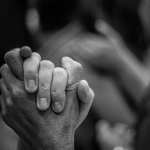
Let’s consider a peace that is achieved throught distributive justice. Again, the Hebrew prophets envisioned a different kind of peace: peace that is born not through military might but by the spirit of justice. In Zechariah we read:
So he said to me, “This is the word of the LORD to Zerubbabel: ‘Not by might nor by power, but by my Spirit,’ says the LORD Almighty.” (Zechariah 4:6)
This is Part 2 of Peace Through Justice Doesn’t Need A War Horse
Welcome Readers! Please subscribe to Social Jesus Here.
(Read this series from its beginning here.)
In chapter 9, Zechariah contrasts the typical military processional image with Jerusalem’s king bringing liberation and peace in such a way that military warhorses are not needed. This kind of peace isn’t rooted in military might at all.
But I will encamp at my temple
to guard it against marauding forces.
Never again will an oppressor overrun my people,
for now I am keeping watch.
Rejoice greatly, Daughter Zion!
Shout, Daughter Jerusalem!
See, your king comes to you,
righteous and victorious,
lowly and riding on a donkey,
on a colt, the foal of a donkey.
I will take away the chariots from Ephraim
and the warhorses from Jerusalem,
and the battle bow will be broken.
He will proclaim peace to the nations.
His rule will extend from sea to sea
and from the River to the ends of the earth. (Zechariah 9:8-10)
The authors of the gospels, beginning with Mark and repeated by each successive canonical gospel afterward, pick up this imagery of peace through distributive justice from the Hebrew prophets. Each of them associates the peace of Jesus unlike the Pax Romana’s military might with the peace that comes through making sure everyone has enough to thrive.
It is also interesting to note that our story this week begins Jesus’ entry into Jerusalem in Zechariah-like fashion in the Mount of Olives. Zechariah explains that the liberation that would come for Jerusalem would begin at the Mount of Olives:
Then the LORD will go out and fight against those nations, as he fights on a day of battle. On that day his feet will stand on the Mount of Olives, east of Jerusalem . . . (Zechariah 14:3-4)
In the years leading up to the Jewish Roman War in the late 60s C.E., the Mount of Olives was a wildly popular site of liberation rallies and starting location for insurrections against Rome because of those words in Zechariah.
The gospel authors have Jesus begin his ride here to tie his entrance to the people’s hope of liberation. The gospel authors even include the liberation cry of the psalmist in Psalm 118:25-26:
“LORD, save us! [Hosanna] LORD, grant us success! [Hosanna] Blessed is he who comes in the name of the LORD. From the house of the LORD [the temple] we bless you.”
The authors of the gospels tap into all of this cultural liberation symbolism in our story this week. But Jesus’ peace and liberation will not come through Jesus leading a stronger military force against Rome’s military forces, but through the holistic and intrinsic work of a distributive justice so powerful, so pervasive, so stable, that it doesn’t require a war steed. It requires nothing more than a colt. Yet these contrasting paths to peace have a lot of applications for us, in our context, today. We’ll consider some of those last, in Part 3.
Are you receiving all of RHM’s free resources each week?
Begin each day being inspired toward love, compassion, justice and action. Free.
Sign up at HERE.















